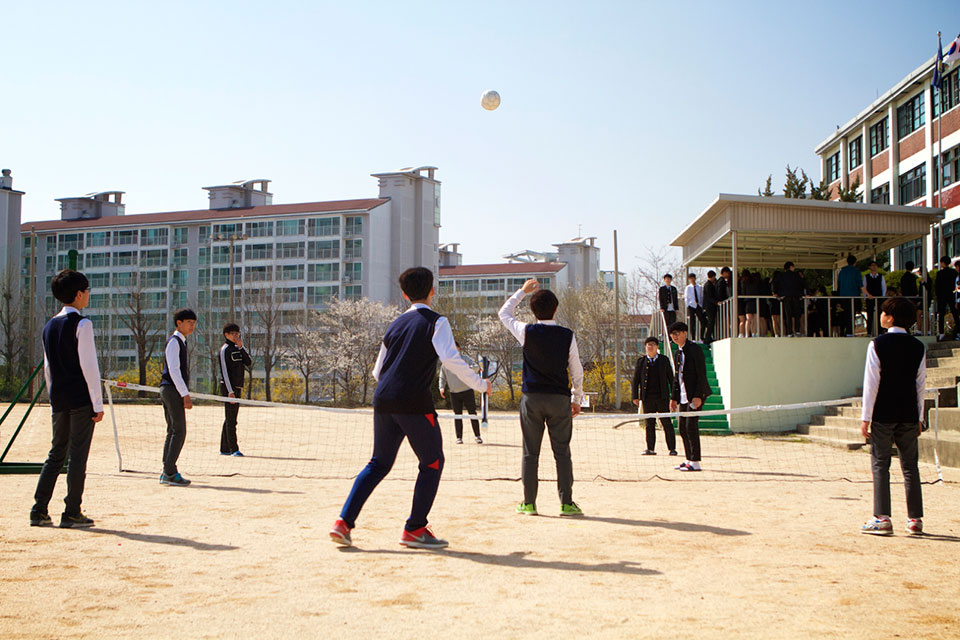Receiving a contract to teach in South Korea could be your ticket to one of the most amazing experiences you can imagine. At the same time, a teaching job here can present you with new challenges, both personal and professional. Whether you’ve just arrived in Korea or have been here for years, I hope this article can provide a little inspiration to everyone.
But first, the facts. There are many different types of teaching positions in South Korea. The range varies immensely: from government and private positions through elementary, middle, and high school, to the private academies that deal with basic English for beginners all the way up to advanced speaking levels. In every position as a Native English Teacher (NET) there are different teaching styles required, different student ages and learning abilities to deal with, and–perhaps most importantly–different expectations from your school or company that need to be met.
The reality is that Koreans expect a lot from NETs regarding their students’ academic results. Results lead to new contracts for teachers, more business, and happier students and parents. This can mean a lot of pressure for anyone in the teaching business, and even more so for someone who is coming to South Korea for the first time.
“Koreans expect a lot from NETs.”
Don’t let this scare you. The positive thing is that there will always be someone there with you, either working beside you in the office or in the classroom as a co-teacher.
Coming to South Korea as a Native English Teacher, there will be days when you feel like the CEO of a company with your own personal assistant. However, there will also be times when you don’t feel quite so in control–times when you get stuck in a circle. A circle doesn’t have corners, or chances to stop and change direction. A circle is a continuous, unbroken loop that repeats itself over and over. Being caught in a circle means there is only one way to do things, with no option to innovate. Every day I wonder, how do I create a square so that I can have the slightest opportunity to think outside of it?
The first step is to vocalize. Don’t be afraid to speak up and give your opinion. I think of multiple ideas and suggestions daily. Are they always accepted by my school? Of course not. But expressing your ideas is still progress, and better than not saying anything at all. If you hear the word “no” ninety-nine times, do you give up? No, you don’t, because every “no” you hear is one step closer to the “yes” you’re looking for. When they finally say yes it will be the best feeling ever.
“Don’t be afraid to speak up and give your opinion.”
Thinking outside the square is not related strictly to the academic side of teaching. What is the best method for gaining students’ attention? Give them a reason to be interested in you. Don’t be the teacher that just sits in his or her office and refuses to socialize. Get outside and kick a soccer ball around, or even just talk to students. Clown around and make the students laugh. Give them something to talk about. Create interest. This is the most powerful teaching tool in your arsenal. Gain their trust. Learn their names. It’s the small things that ultimately make the biggest difference.
If you are one of the lucky teachers who are not stuck in a circle, please take advantage of this and run with it for as long as you can. Come up with creative ideas. Don’t be scared to take initiative and deviate from the textbook.
Sometimes the things right in front of your face are the hardest to see. I wish I had come to this realization years ago. What is it that NETs have, that no Korean teacher can ever mimic? It is the native English accent, the Western culture, the native English conversation experience. If you took the IELTS or TEPS test in Korea alongside a Korean student, who do you think would get a higher score? Nine times out of ten it would not be the native English teacher. English grammatical ability in Korea is insanely high. The area in which most students are lacking is natural conversational ability.
“English grammatical ability in Korea is insanely high.”
If you have a co-teacher, or are in a position where the students learn grammar from other teachers, focus your class solely around conversation. Talk to your students and listen when they talk in return. Structure conversations around topics that get the students interested in speaking. Have fun and steer clear of the textbook. One of the best ways to get students involved is group work and talking to each other. Group work has a strong ability to bring students out of their shells, thus allows them to express themselves. Every single class students sit individually and in rows. Bring change to the class, this will engage the students and participation in activities and speaking will increase dramatically.
This is, of course, simply my own opinion. However, it is something that has worked well for me before and has engaged the students enormously. They are in your class because they want to hear your voice and get an idea of what it’s like living on the other side of the world. Many students will never once set foot on a plane or travel overseas. You are their international experience.
“You are their international experience”
They want to listen to you. Even if they don’t understand everything you say, trust me, they want to. Will your throat be sore? Will you be tired? Absolutely, but give them the experience. Teach them about where you’re from, what you do back in your country, about national holidays and traditions. Give your students hope about opportunities abroad. This is the reason your students want to learn English. Be the person to give them hope.
Show them the world, and good luck in the classroom.
-Edited by Lindsay McEwen
Featured image courtesy of Yahoo. All other photos provided by Michael Klish and Edmund Rustia.








There is some vey positive and very useful advice in this article but I can’t help but feel like you’ve purposely avoided all of the genuinely troubling issues that NETs all too often face.
What if your co-teacher is being unreasonable?
What if you suspect management is performing illegal practices?
What if you aren’t allowed to deviate from the error-filled textbook?
What if your students only take English because it’s mandatory or their parents expect them to excel at a subject which they hate?
Personally I’ve had a positive experience here and I’ve grown as a teacher and a person; but the answers in this article would not have helped me when I was struggling with these difficult and extremely common problems. Sometimes it is really difficult teaching in Korea and articles like this gloss over the harsh reality of being an NET in Korea.
“The first step is to vocalize. Don’t be afraid to speak up and give your opinion. I think of multiple ideas and suggestions daily. Are they always accepted by my school? Of course not. But expressing your ideas is still progress, and better than not saying anything at all. If you hear the word “no” ninety-nine times, do you give up? No, you don’t, because every ‘no’ you hear is one step closer to the ]yes’ you’re looking for. When they finally say yes it will be the best feeling ever.
‘Don’t be afraid to speak up and give your opinion.’ ”
Has the author actually spent anytime in Korea? Koreans take suggestions the way army generals take suggestions from privates: not at all and not even bother trying. Korea is even more top-down than the military.
Also, you forgot to mention the rampant disregard for labor law and how often, even those in public schools and universities, are routinely robbed of their pay, legally mandated benefits, and contractual perks like vacation.
What a joke.